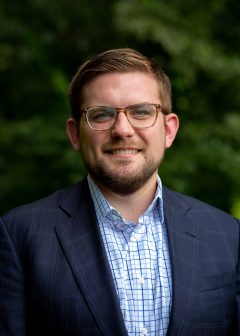The journalist enlisted his passion for investigating and a simple Google search to better serve his community.
Nick Ochsner ’11 isn’t exactly one for storytelling — at least not in the dolled-up narrative storytelling sense.
He likes to stick to what he excels at most: reporting, digging up information, holding people accountable, and asking questions. But when it came time to cover the 2018 North Carolina 9th Congressional District scandal, which involved the collecting of absentee ballots and subsequent election fraud allegations, he knew that something much bigger than a breaking news report was warranted. His next step? A ‘how to write a book’ Google search.

For Ochsner, now a chief investigative reporter at WBTV in Charlotte, the scandal felt anything but revolutionary when rumors began to spread. Having grown up in Fayetteville, North Carolina — less than an hour’s drive north of Bladen County, where the scandal took place —the 9th District was familiar, and fraud allegations seemed to sprout up like weeds on the nightly news.
“I thought, ‘This isn’t going to be anything big. I’ve got other stuff I’m working on,’” Ochsner said. It wasn’t until fellow Elon alumnus and friend Joe Bruno ’14 broke the story that Ochsner decided to give in. “I called my bosses and said, ‘Well, I guess I got to go to Bladen County. I don’t know what I’m going to get, I don’t know what it’s going to be, but I’ve got to go to Bladen County.’”
The scandal, which marked the first time in modern history that a congressional race had been thrown out because of fraud allegations, found McCrae Dowless—former political operative serving as vice chair in the Bladen County Soil and Water Conservation District — front and center of the ballot investigation. Thanks to his backdoor, friend-of-a-friend kind of access to the neighborhood, Ochsner’s first stop in Bladen County was on none other than Dowless’ doorstep.
“I was sitting in McCrae Dowless’ kitchen in December of 2018,” Ochsner said. “Something had happened that afternoon, and I said to myself, ‘This is so crazy. Someone’s going to write a book about it. Maybe it ought to be me.’”
And so, in conjunction with co-author, friend, and former Politico journalist Michael Graff, “The Vote Collectors” was published Nov. 16, 2021.
Had you told Ochsner 10 years ago that he’d be a published author now, he wouldn’t have believed you. The broadcast major’s career-end goal was never journalism; it was politics. In fact, he spent his undergraduate years running Elon’s College Republicans club, reporting with Phoenix14 News, the predecessor of Elon Local News, and most memorably, working on statewide political campaigns—successful ones, too. “It was like a full-time job,” he remembered. Come graduation, Ochsner had a dream offer: an easy-in to the world of politics. He turned it down.
“I decided the call of journalism was too strong, and I couldn’t overcome it. So I went into journalism, after all,” he said.
Writing a book doesn’t happen overnight. Sure, Ochsner worked for Phoenix 14, but that fell accidentally into his lap thanks to an older student who recruited him to the news organization. Ochsner’s storytelling muscle is one he’s had to work at—likely more than the average journalist.
“I’ve not been drawn to storytelling, right? I’ve been drawn to facts and investigating and uncovering things,” he said. “And it’s only through my decade-plus of reporting that I’ve come to realize that, if you want people to really care about the facts and the things that you’ve uncovered, you’ve got to give them a character and you’ve got to give them a compelling narrative. You can dig up all the best stuff in the world, but no one’s going to read it unless you tell them the story they want to read.”
He credits Graff, the “best writer I know, period,” and their time writing “The Vote Collectors” for helping him strengthen that storytelling muscle. Where Ochsner would lay out the facts, Graff would shape them into a narrative, adding a few adjectives here and there, too. “We approach our work so differently … and we’re kind of wired differently, but really complementary,” Ochsner said.
Though book publishing wasn’t always part of his plan, Ochsner has found the process extremely rewarding and has enjoyed navigating the “quirks,” as he calls them, of the publishing industry. One of those quirks? An author always signs a book on the title page.
“We’ve gotten high praise from both Republicans and conservatives and from Democrats and liberals, who’ve individually read the book and liked it,” Ochsner added. “You know, in this polarized time, to have both sides, both parties, both sides of an event, read it and say, ‘Yeah, you did a good job and we like it,’ that’s rare, and that’s gratifying.”


